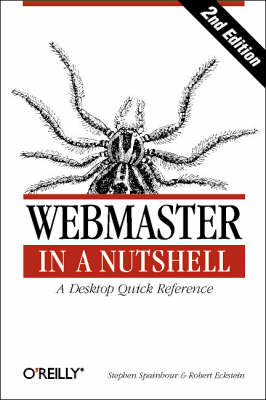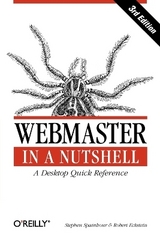
WebMaster in a Nutshell
O'Reilly Media (Verlag)
978-1-56592-325-6 (ISBN)
- Titel erscheint in neuer Auflage
- Artikel merken
Individuals, organizations, and businesses are relying on their Web pages to provide and collect information, manage processes, and interact with communities and customers. A reliable, informative, and responsive Web site can reduce cost, increase visibility, and create a positive image for the owner of that site. Behind every successful Web page is an overworked and underappreciated Webmaster. Webmasters make sure that the information on a site is accessible and usable; that the site is always available; that performance is good; that users can get the information that they need; and that the site can collect the information it needs to serve those users. These disparate tasks require many different tools and skills. Webmaster in a Nutshell pulls together in a single volume all the essential reference information for Webmasters working on UNIX-based Web servers. In this second edition of Webmaster in a Nutshell, we've updated our material to include the latest versions of HTML and Javascript, and also expanded the book to cover the newest technologies emerging on the Web. The book covers: HTML 4.0
, with special attention to forms, tables and frames CSS (Cascading Style Sheets) XML, the next-generation markup language for the Web CGI, with a chapter dedicated to the Perl module CGI.pm JavaScript 1.2 PHP, the HTML-embedded programming language HTTP 1.1, the underlying protocol that drives the Web Apache server administration, including Apache modules mod_perl, the Apache module for enhancing CGI performance and providing a Perl interface to the Apache API Performance tips for the Web Webmaster in a Nutshell, part of the bestselling O'Reilly series of reference books, makes it easy to find the information you want about the technologies you use. You'll keep your other books on the shelf; you'll keep Webmaster in a Nutshell next to your keyboard.
Stephen Spainhour is a writer for O'Reilly & Associates. He coauthored the first edition of Webmaster in a Nutshell, as well as Perl in a Nutshell, and contributed to many other O'Reilly titles. He is an avid fan of professional tennis, and when he's not checking for tennis scores on the Web, he enjoys cooking, electronic music, and watching too much television. Robert Eckstein enjoys dabbling with just about anything related to computers. From rendering to electronic commerce to compiler construction to fuzzy logic, most of his friends agree that Robert spends far too much time in front of a computer screen, and is the world's largest consumer of caffeine. Robert has recently coauthored Java Swing for O'Reilly, and in his spare time is known to provide online coverage for popular conferences. He holds honors degrees in computer science and communications from Trinity University in San Antonio, Texas. In the past, Robert has worked for the USAA insurance company and more recently spent four years with Motorola's cellular software division. He now lives in Austin, Texas, with his wife Michelle; they hope to adopt a talking puppy soon.
Preface Chapter 1. Introduction The Web in a Nutshell Who Are the Webmasters? Recommended Books PART 1: HTML Chapter 2. HTML Overview HTML Document Structure HTML Syntax JavaScript Event Handlers Chapter 3. HTML Reference Core Attributes HTML Tag and Attribute Descriptions Chapter 4. Frames Frame Layout Nested Framesets The Tag Frame Targets Frame Border Attributes Chapter 5. Tables The Tag The Tag The Tag The and Tags Border Color and Backgrounds Advanced Table Tags Chapter 6. Forms The Tag The Tag The Tag The Tag An Example Form Chapter 7. Character Entities Chapter 8. Color Names and Values PART 2: CSS Chapter 9. Cascading Style Sheets The Elements of Styles Style Syntax Style Properties CSS Reference PART 3: XML Chapter 10. XML XML Terminology XML Reference Document Type Definitions The Extensible Stylesheet Language XLink and XPointer PART 4: JavaScript Chapter 11. JavaScript JavaScript Reference JavaScript Syntax Variables Data Types Expressions and Operators Statements Regular Expressions JavaScript in HTML Client-Side Object Hierarchy Windows and Frames Forms Events JavaScript Security Restrictions Global Properties Global Functions Alphabetical Object Reference PART 5: CGI and Perl Chapter 12. CGI Overview A Typical CGI Interaction URL Encoding Extra Path Information CGI Environment Variables Chapter 13. Server Side Includes Configuring the Apache Server for SSI and XSSI Basic SSI Directives SSI Environment Variables Configurable Time Formats for SSI Output Conditional Statements Chapter 14. The CGI.pm Module HTML Tag Generation Importing Method Groups Maintaining State Named Parameters Using JavaScript Features Debugging CGI.pm Reference Chapter 15. Web Server Programming with mod_perl Design of mod_perl Installing mod_perl mod_perl Handlers Running CGI Scripts with mod_perl Server-Side Includes with mod_perl Sections Apache:: Modules PART 6: PHP Chapter 16. PHP Configuration Embedding PHP in HTML Language Syntax Variables Data Types Expressions Operators Control Structures Functions Web-Related Variables Examples Function Reference Array Functions Configuration and Logging Functions Database Functions Date/Time Functions Directory Functions File Functions Graphics Functions HTTP Functions IMAP Functions LDAP Functions Math Functions PDF Functions String Functions Variable Manipulation Functions XML Functions Miscellaneous Functions PART 7: HTTP Chapter 17. HTTP Client Requests Server Responses and Status Codes HTTP Headers Cookies Media Types and Subtypes PART 8: Server Configuration Chapter 18. Apache Configuration Understanding Apache Basic Server Configuration: Core Directives Chapter 19. Apache Modules mod_access mod_actions mod_alias mod_auth mod_auth_anon mod_auth_db mod_auth_dbm mod_autoindex mod_browser mod_cern_meta mod_cgi mod_cookies mod_digest mod_dir mod_dld mod_dll mod_env mod_example mod_expires mod_headers mod_imap mod_include mod_info mod_isapi mod_log_agent mod_log_common mod_log_config mod_log_referer mod_mime mod_mime_magic mod_mmap_static mod_negotiation mod_proxy mod_rewrite mod_setenvif mod_so mod_speling mod_status mod_userdir mod_unique_id mod_usertrack Chapter 20. Server Performance Turn Off Reverse DNS Lookups Use the Most Recent Version of Your Server Keep HTML Content and HTTP Logs on Different Disks Keep Content as Small as Possible Performance Tips for HTML Authors Graphics Preprocess Queries and Cache the Results Use Servlets or Server APIs Increase RAM and Bandwidth Look for Excessive TCP Retransmits Use the Same TCP MTU as Your ISP Use a Trailing Slash When Requesting a Directory Index
| Erscheint lt. Verlag | 6.7.1999 |
|---|---|
| Überarbeitung | Robert Eckstein |
| Zusatzinfo | Illustrations |
| Verlagsort | Sebastopol |
| Sprache | englisch |
| Maße | 153 x 229 mm |
| Gewicht | 660 g |
| Einbandart | kartoniert |
| Themenwelt | Mathematik / Informatik ► Informatik ► Web / Internet |
| ISBN-10 | 1-56592-325-1 / 1565923251 |
| ISBN-13 | 978-1-56592-325-6 / 9781565923256 |
| Zustand | Neuware |
| Haben Sie eine Frage zum Produkt? |
aus dem Bereich



